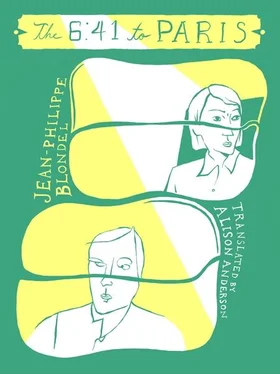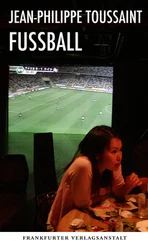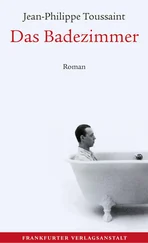A jolt.
Two jolts.
A sigh.
The train has started moving again.
In front of us, behind us, the passengers on the 6:41 train, due to arrive at the Gare de l’Est at 8:15, are getting to their feet, taking their luggage down from the overhead rack, rubbing their eyes, wiping their hands over their faces, blinking, and getting their bearings: station platform, Métro, stairs, sidewalks, two hundred yards, building, office, quick coffee from the machine, good morning to all and sundry, files, debriefing, slightly tense smile, another week has begun.
They’re intimidating, all these passengers standing one behind the other waiting for the line to start moving, to alight from the train, watch the steps, place their feet on the asphalt and begin the race. They clear their throats, check their watches for the twentieth time. They have little tics: they scratch the top of their eyebrows, or their neck, or their earlobe. They are drawing up their lists of things to do. People to see. The chorus of names. And in the middle of all that, incongruously, their spouses, their children — the people they’ll see only too briefly, until next weekend.
They’re so intimidating that you don’t dare look at them. And since Cécile Duffaut and Philippe Leduc don’t dare look at each other, either, they are staring at the dirty floor of the train: there’s a grayish pink wad of crushed chewing gum, an empty bottle of mineral water. They’re sorry they ever started that conversation: What were they thinking?
Or maybe they’re sorry they didn’t start it earlier. They’re a bit puzzled. A bit lost. They can’t quite tell what will happen next. They are about to look up and speak again at the same time, but Cécile Duffaut senses this, and she gets there first. She says, “I saw your friend, Mathieu Coché—well, I don’t know if he’s still your friend, but the friend that you used to have, anyway, way back when. In a magazine. I saw him in a magazine.”
She feels like a complete idiot.
She has repeated the word “friend” three times. And “magazine” twice.
She can see the red ink, her ninth-grade French teacher crossing out all her repetitions and writing in the margin, “Expand your vocabulary, for goodness’ sake!!!” With all those exclamation marks. That was the most humiliating thing about it, all those exclamation marks. You always feel crushed by an exclamation mark. It’s like a stone falling from a wall — and you’re standing right in its path. Why did she suddenly think of that, just now?
Why did she bring up Mathieu Coché?
Check out the expression on Philippe Leduc’s face.
As if an entire army of exclamation marks had tumbled down upon him.
“He … I’m on my way to see him.”
“Sorry?”
“That’s why I’m on this train, I’m going to see him.”
“Oh. That’s great. Tell him I said hello. Although I’m not sure he’ll remember me.”
“He’s in the hospital.”
“Oh dear. I hope it’s not serious?”
“He’s dying. That’s why I’m going to see him. Because he’s going to die. Any day. So, I’m going to see him. You know what I mean?”
She doesn’t answer. She doesn’t know what to say. As if she’s driven down a one-way street the wrong way. There’s a part of her that would like to continue the conversation, “Oh, look at that graffiti under the bridge, that’s original, isn’t it? Have you seen any good films recently?” But suddenly there is police tape everywhere, like in a crime film, a flimsy barrier that stops you going any farther and above all entering the scene of the crime. She can no longer put any words to what she feels. She is standing across from this imbecile whose eyes have misted over, and she’s not doing so great herself, the corners of her eyes are stinging, it’s idiotic, over someone she hardly knew almost thirty years ago, no, it makes no sense. She frowns: that ought to send any threatening tears in another direction. She murmurs, “What does he have?” and in her mind, a succession of images: hospital corridors, blood tests, surgeons’ faces, HIV, scanners, bodies entering a tunnel, George Clooney in E.R. Philippe Leduc tilts his head and says, “Cancer. Terminal, obviously.” And there are all those people going by with their bags, their suitcases, their briefcases, where are they going, which Métro station, what will happen to them today, who knows, maybe one of them has just taken their last train ride, and they don’t know it yet, but it was their last ride, and later on, they’ll be crossing a busy street without paying attention, and boom, it’s all over, move along now, there’s nothing to see.
Philippe is brave. He pulls himself together. She has no way of knowing all he’s been through over the last ninety-five minutes, on the train. She has no way of knowing that he has revisited it all, that he has been back to London. That is also why his eyes filled with tears all of a sudden. He apologizes. He’s annoyed with himself, too. He would like, one day, to be able to stop apologizing. Now, awkwardly, he tries to get the conversation going again.
“And you … what brings you to Paris?”
But all these people are getting off and soon the car will be empty, it’s so late, it’s much too late. She replies, “I work here. I live here,” getting to her feet at the same time, and Philippe moves to one side. But he doesn’t give in. Now that he’s taken the first step, he presses on. He asks her if she has children. It is so totally irrelevant, completely out of left field, that Cécile Duffaut cannot help but smile and say, “Yes. A daughter. She’s all grown-up now. At the lycée.” She wants to get her bag from the luggage rack but he’s quicker than she is. He takes the opportunity to tell her that he also has children, two of them, grown-up now, too, it’s strange, isn’t it?
“What’s strange?”
“When we were younger, we never imagined that we’d have kids one day.”
This time she laughs. She can’t help it. He opens his eyes wide. He doesn’t see what’s so funny. She waves her hand as if to say, “Never mind, it’s nothing,” and then she does something, she places her hand on his shoulder, the way a father would, or a friend, or a brother, and it’s very unsettling. In a kindly tone, she adds, “It’s much too late to get to know each other again, and I don’t take this train very often. I don’t know if we’ll meet again. Take care.”
“Take care.”
He’s always hated that expression. It is one of his mother’s favorite stock phrases, she uses it with everyone — neighbors, mailman, baker, son, nephews, brother, butcher at the supermarket, husband back in the day. Everyone is entitled to take care: of their activities, their everyday business, minor dramas, minor joys, the world is a crowd of plastic Playmobil figures jerkily waving their arms, spouting off from their invisible mouths, hearing without ears, their hair always impeccably styled, and they go about their assigned business, all of them, ceaselessly, taking care, it’s good, to take care, it’s fine.
And it’s the same for all those people who, one after the other, have left the railroad car, they are taking care, that’s good, they’re making calls on their cell phones to say when they’ll be there, they’re sending text messages so others know they’ve gotten off the train, they fiddle with their earphones, their touch screens, the keys on the keyboard, they’re clicking and communicating yet there’s not a sound, just a hollowness, they are merely indicating that they are taking care and that’s good, I’m taking care and that’s good, everything is collapsing all around me, worse than that, everything is made of cardboard, of putty, of plastic, the hospital is a bed with a thermometer but I’m a nurse, I wear a blue helmet with a transparent visor and carry a truncheon so I’m a policeman, I have a hammer and a hard hat so I’m a builder — I don’t have any questions to ask, I know what I have to do, I’m taking care and that’s good, I always take care and that’s good, and get on with it, get on with it, you have to get on with it.
Читать дальше












